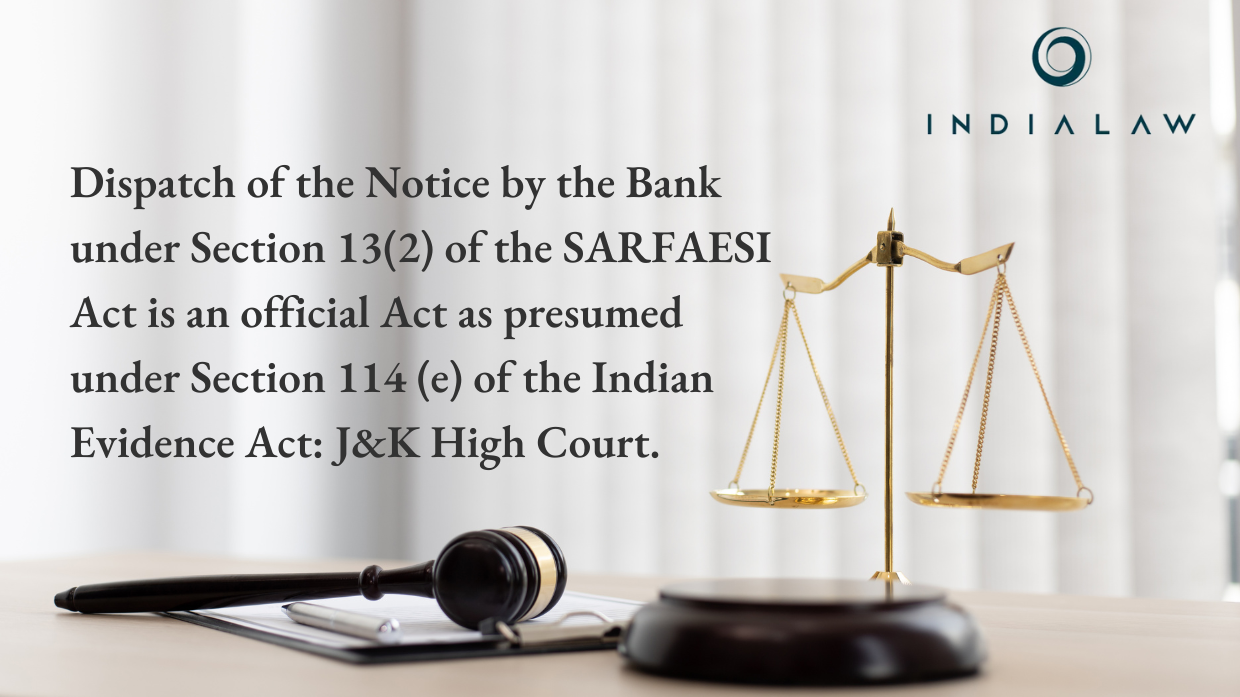Dispatch of the Notice by the Bank under Section 13(2) of the SARFAESI Act is an official Act as presumed under Section 114 (e) of the Indian Evidence Act: J&K High Court.

The Hon’ble Division Bench of Jammu & Kashmir and Ladakh High Court, comprising of Justice Atul Sreedharan and Justice Mohan Lal vide order dated 22nd May 2023 [i] held that dispatching the notice under Section 13(2) of SARFAESI Act by the Bank raises a presumption that its judicial and official duties have been performed regularly as per Section 114 (e)of the Evidence Act.
Table of Contents
Facts Of The Case:
The Writ Petition was filed by M/s. Shaf Sons, is a partnership firm engaged in trading Kashmiri Handicrafts. The firm had obtained a loan from the Respondent Bank in the form of a Cash Credit Limit. The Petitioner contended that they had approached the Bank for a one-time settlement of their outstanding debt, however, the Bank rejected the said proposal and granted subsequent opportunities to the firm to improve its offer.The firm made a final offer of Rupees 1.40/- Crores, which was also turned down by the Bank. The Bank thereafter issued a notice under Section 13(4) of the SARFAESI Act against the firm. The Petitioners have challenged the said notice in the Writ Petition.
Contentions Of The Parties:
The Learned Counsel representing the Petitioners contended that the Bank had failed to provide a reasonable opportunity for them to settle their debt. It was stated that the Bank kept the Petitioner under the impression that the settlement was still possible, and unlawfully issued the notice under Section 13(4) of the SARFAESI Act. It was further argued by the Counsel for the firm that there was a violation of natural justice because the Notice under Section 13(2) which specifies his liability and the time period within which he had to discharge the said liability was never issued to them.
The Learned Counsel for the Respondent Bank countered the submissions made by the Learned Counsel for the firm, stating that it was factually incorrect. The Counsel referred to the objections filed by the Respondent Bank and pointed to a notice dated 04.08.2021, dispatched via registered AD to the Borrowers and the Guarantors asking the Firm to settle the outstanding amount due to the Bank which was Rupees2,12,13,532/- from the total debt of 2,43,00000/-.
The Counsel for the Respondent Bank stated that the notice under Section 13 (2) was dispatched to the Petitioner before the notice of possession under Section 13 (4) of the SARAFESI Act was issued. Furthermore, the Learned Counsel challenged the maintainability of the Writ Petition on the grounds that the firm should have pursued a suitable alternative remedy available to them instead of invoking the jurisdiction of the Hon’ble High Court under Article 226 of the Indian Constitution.
Findings Of The Court:
The Hon’ble High Court held that the Respondent Bank has proved that the Notice under Section 13(2) was duly dispatched to the Petitioners. The Hon’ble Court further observed that the Section 114(e) of the EvidenceAct raises a presumption that the judicial and official acts have been regularlyperformed. Dispatching of the notice by the Bank under Section 13(2) of the SARFAESI Act is an official Act performed by it in the discharge of its functions.It was held that, “this Court must assume prima facie that the said notice was regularly dispatched to the petitioner in the ordinary course of business of the Bank.”
The Hon’ble High Court observed that the copy of the said notice raises a presumption in favour of the Bank, suggesting that a Notice was indeed issued to the Petitioners. The Court noted that the Petitioner’s contentions of not receiving the said notice due to the absence of their signature or a postal department endorsement indicating refusal to receive the same or that the petitioner was not living in the said premises, raises a significant disputed question of fact. The Court further emphasized that this question can only be decided by the DRT after adducing evidence.
The Hon’ble High Court further observed that there was no violation of natural justice as the record shows that the Section 13(2) notice was issued to the Petitioner and despite being given sufficient opportunity, the Petitioners did not respond to the said notice.
The Hon’ble Court also noted that the Petitioner has failed to demonstrate why the alternate remedy under the SARFAESI Act would not be equally efficacious. It refers to the Whirlpool Corporation vs. Registrar Trademark Mumbaicase,[ii]highlighting that the Petitioner must establish special circumstances justifying the invocation of Article 226 despite the availability of an alternate remedy.
Furthermore, the Hon’ble Court also referred to the case of Gobinder Kour and Others vs. Punjab National Bank[iii]relied upon by the firm, and observed that its factual context differs significantly from the present case as there was no record to show that there was any acceptance by the Respondent Bank of any One-TimeSettlement put forth by the Petitioners in the instant case. In the absence of such an acceptance of the OTS proposal by the Bank, the Hon’ble Court found the said judgment inapplicable.
Accordingly, the Hon’ble High Court while dismissing the Writ Petition, emphasized that its observations should not influence the DRT proceedings.
[i] WP(C) No. 407/2023
[ii] (1998)8 SCC (1)
[iii] 2014 AIR (PIH 8)
By entering the email address you agree to our Privacy Policy.



